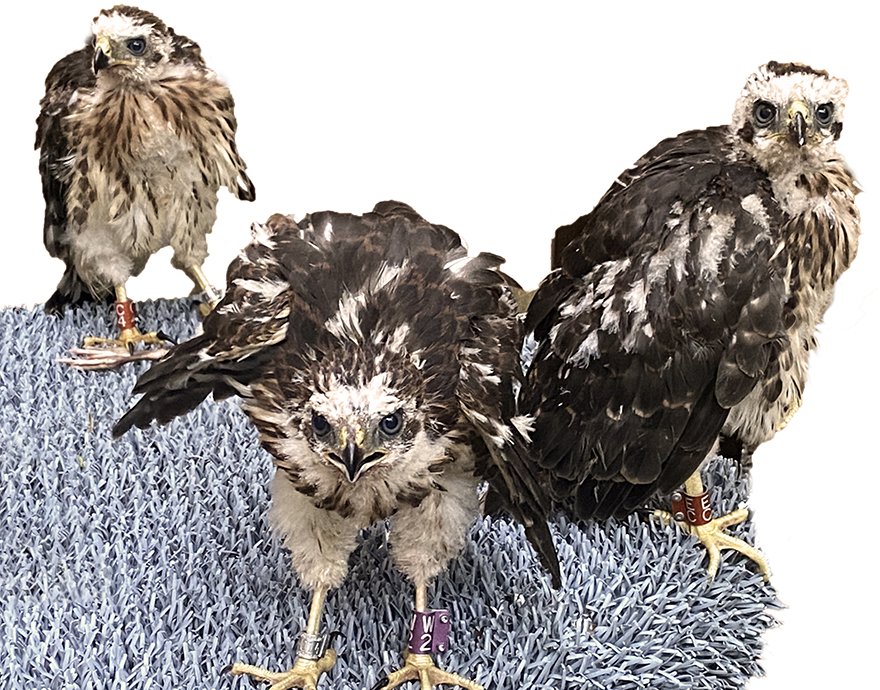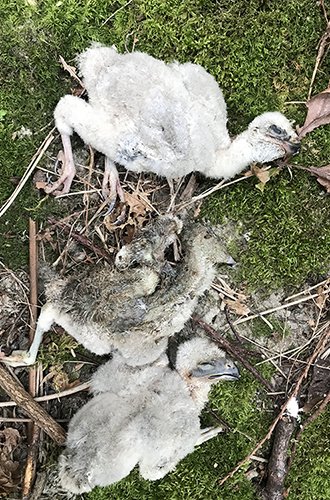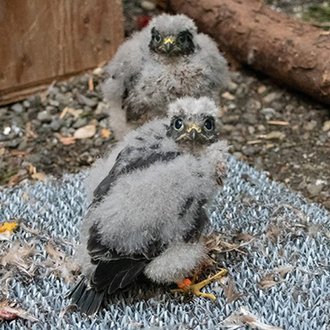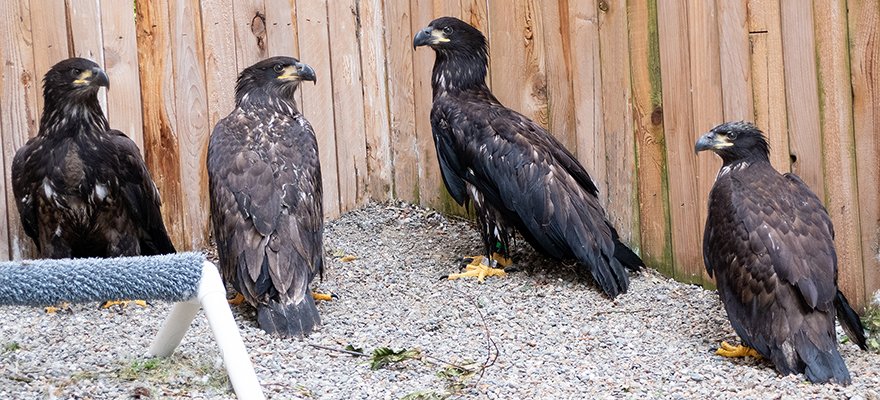URC Update | Summer 2021
The June Heat Wave

Banded young Cooper’s hawks
In late June 2021, the Pacific Northwest experienced an unprecedented three consecutive days of temperatures over 100 degrees. In Seattle, the official high temperatures were 102, 104, and 108. This extreme heat occurred during peak nesting season for raptors and other birds, rather than in August, when all nestlings would have fledged.
As the temperatures hit the 90s and the 100-degree forecast loomed, three young peregrine falcons that had fledged too soon were in care at PAWS Wildlife Center. The timing of their release back to their parents was harrowing, because the impending extreme heat ran up against their readiness to fly. One was released just before and the other two just after the three days of 100+ degrees. We don’t know their fates.
In the unrelenting heat, many raptor nestlings jumped, fell, or were forced from the nest before they could fly. Older nestlings seemed to fare better than downy chicks. Two Seattle Cooper’s Hawk nests lost 1-3 young, and at least two total nest failures were blamed on the heat. PAWS received many of the raptor survivors, all too young to fly: 12 Cooper’s hawks, eight bald eagles, five merlins, and one sharp-shinned hawk, with more to come. Banders Jeff Brown and Patti Loesche were kept busy in July, banding 26 raptor heat refugees, and Ben Vang-Johnson banded the four surviving merlins—a total of 30 banded raptors. In the previous July, only seven raptors were banded at PAWS.
A small silver lining is that some of these helpless youngsters led us to two Cooper’s hawk nests in Seattle that we’d previously missed. Sadly, the South Cheasty nest was found via the discovery of three dead chicks about 10 days old below their nest. A fourth chick was later found alive and well, still in the nest. As we tell below, knowledge of this survivor allowed us to provide a foster home for an orphaned Coop.

Sharp-shinned hawk nestling

Dead Cooper’s hawk nestlings below South Cheasty nest, Seattle (Krissy Shaw)

Merlin nestlings
A second nest was found in Georgetown when a just-fledged youngster blundered over the security fence into Boeing Field and was apprehended. In another finding, the rescue of a nestling sharp-shinned hawk led to the discovery of its nest site and siblings. It is rare to find a sharpie nest in our region.
Jeff Brown, wildlife naturalist at PAWS, sent out a call for help in finding the nests and parents of the many young raptors in PAWS care. The youngsters would be ready for release once they could fly, but they would still depend on their parents for food for several weeks. If the parents could not be found, the young couldn’t be released. Several URC volunteers stepped up and spent hours tracking down eight nest locations and occupancy in Redmond, Kirkland, and Covington—thank you all! The rest of the rehabbed raptors were released after intensive scouting and much patience by Jeff with his interns Michelle and Sarah. As a result of our combined efforts, most of these birds were successfully released back to their families in the Seattle area. The Seattle Times (7/28/21) covered one release here.
For two young Coops, we were unable to find the nests or parents, but PAWS was able to foster them with other families with young the same age. One fostered youngster was released at the South Cheasty site, where both parents were (over)feeding the single surviving fledgling. A merlin fledgling was also successfully fostered to a site in Maple Leaf with three other youngsters (merlin nests typically have five offspring). Kim McCormick kept vigil over this orphan for hours until it was fed by its foster parent at dusk.
As badly as Seattle’s raptors fared during the heat wave, the situation was far worse in Portland, where the temperature peaked at 116 degrees. Bob Sallinger of Portland Audubon wrote, “We got hit extremely hard… What was most extraordinary though was the influx of Cooper’s hawks. There were periods where we had as many as 6-7 people lined up to drop off…1-4 Coops at one time… We also saw a large variety of other species but nothing came close to the Coops. We took in 110 Coops during the heat domes.” As of 7/20/21, Bob reported that of these 110 Coops, 64 were released back at the site of origin, 19 were still in care, and 27 either had to be euthanized or died during treatment.
This report is, of course, just a glimpse of the consequences of the sudden and devastating June heat on young raptors and wildlife in general. Although we hope this was a rare event, we fear that it is a harbinger of our future. Long-term studies of our urban raptors are more important now than ever.

Four rehabbed eaglets ready for release
All photos PAWS Wildlife Center except as noted.